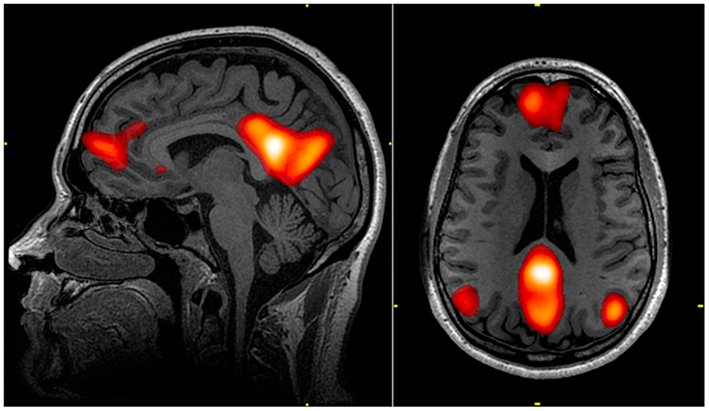Meditating Measurably Changes The Brain Even When Not Actively Meditating
by April McCarthy, PreventDisease
A new study has found that participating in an 8-week meditation training program can have measurable effects on how the brain functions even when someone is not actively meditating.
Donate to In5D
With over 6,000+ free articles and 1,200+ free videos, any donation would be greatly appreciated!
Much love for your kind donation,
Gregg
Published research has demonstrated that the practice of regular meditation can increase brain density, boost connections between neurons, decrease symptoms of depression and anxiety, provide clarity of thought, and increase positive mood endorphins. Other published studies have shown meditation can improve physical functioning, decrease chronic disease risks, and enhance overall quality of life.
In a 2008 study published in the journal PloS One, researchers found that when meditators heard the sounds of people suffering, they had stronger activation levels in their temporal parietal junctures, a part of the brain tied to empathy, than people who did not meditate.
These studies demonstrate that regular meditation effectively supports mental, emotional and physical health in numerous tangible ways. In building upon this strong body of evidence, researchers are continuing to deepen our understanding of the profound and inspirational benefits of regular meditation practice in everyday life.
In their latest report in the November issue of Frontiers in Human Neuroscience, investigators at Massachusetts General Hospital (MGH), Boston University (BU), and several other research centers also found differences in those effects based on the specific type of meditation practiced.
“The two different types of meditation training our study participants completed yielded some differences in the response of the amygdala — a part of the brain known for decades to be important for emotion — to images with emotional content,” says Gaelle Desbordes, PhD, a research fellow at the Athinoula A. Martinos Center for Biomedical Imaging at MGH and at the BU Center for Computational Neuroscience and Neural Technology, corresponding author of the report. “This is the first time that meditation training has been shown to affect emotional processing in the brain outside of a meditative state.”
Several previous studies have supported the hypothesis that meditation training improves practitioners’ emotional regulation. While neuroimaging studies have found that meditation training appeared to decrease activation of the amygdala — a structure at the base of the brain that is known to have a role in processing memory and emotion — those changes were only observed while study participants were meditating. The current study was designed to test the hypothesis that meditation training could also produce a generalized reduction in amygdala response to emotional stimuli, measurable by functional magnetic resonance imaging (fMRI).
Participants had enrolled in a larger investigation into the effects of two forms of meditation, based at Emory University in Atlanta. Healthy adults with no experience meditating participated in 8-week courses in either mindful attention meditation — the most commonly studied form that focuses on developing attention and awareness of breathing, thoughts and emotions — and compassion meditation, a less-studied form that includes methods designed to develop loving kindness and compassion for oneself and for others. A control group participated in an 8-week health education course.
Within three weeks before beginning and three weeks after completing the training, 12 participants from each group traveled to Boston for fMRI brain imaging at the Martinos Center’s state-of-the-art imaging facilities. Brain scans were performed as the volunteers viewed a series of 216 different images — 108 per session — of people in situations with either positive, negative or neutral emotional content. Meditation was not mentioned in pre-imaging instructions to participants, and investigators confirmed afterwards that the volunteers had not meditated while in the scanner. Participants also completed assessments of symptoms of depression and anxiety before and after the training programs.
In the mindful attention group, the after-training brain scans showed a decrease in activation in the right amygdala in response to all images, supporting the hypothesis that meditation can improve emotional stability and response to stress. In the compassion meditation group, right amygdala activity also decreased in response to positive or neutral images. But among those who reported practicing compassion meditation most frequently outside of the training sessions, right amygdala activity tended to increase in response to negative images — all of which depicted some form of human suffering. No significant changes were seen in the control group or in the left amygdala of any study participants.
“We think these two forms of meditation cultivate different aspects of mind,” Desbordes explains. “Since compassion meditation is designed to enhance compassionate feelings, it makes sense that it could increase amygdala response to seeing people suffer. Increased amygdala activation was also correlated with decreased depression scores in the compassion meditation group, which suggests that having more compassion towards others may also be beneficial for oneself. Overall, these results are consistent with the overarching hypothesis that meditation may result in enduring, beneficial changes in brain function, especially in the area of emotional processing.”
The neuroscientists at UCLA compared meditators of different experience levels to people who never meditated. In those who meditated, they found significant increases in cortical folding across a wide area of the brain responsible for numerous functions beyond rapid information processing and retrieval. Additional areas of the brain markedly affected by meditation involve emotional and mental health capacities, influencing processes of emotional control, heightened awareness, and introspection. This falls directly in line with some of the more noticeable results of regular meditation, which often include increased compassion for one’s self and others, enhanced self awareness and introspection, and greater emotional stability.
About the author: April McCarthy is a community journalist playing an active role reporting and analyzing world events to advance our health and eco-friendly .
Image: Pixabay
See EXCLUSIVE In5D videos and ad free articles on Patreon for a minimal donation! https://www.patreon.com/in5d
Follow In5D on Patreon, Telegram, Twitter, Bitchute, TikTok, Instagram, Facebook, YouTube, Gab, and Truth Social @greggprescott
Follow In5D on Patreon, Telegram, Twitter, Bitchute, TikTok, Instagram, Facebook, YouTube, Gab, and Truth Social @greggprescott 
















